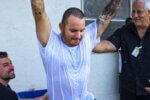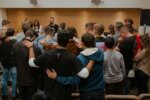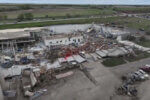The move of the Holy Spirit today in this African nation has produced staggering results. But vibrant young churches face violence almost daily.
In Ethiopia, an east African nation still rebounding from years of war, famine and disease, churches are experiencing explosive growth, miraculous healings and deliverance in what some are calling real revival.
“Ethiopians are experiencing what can only be called a nationwide revival,” one church leader says. “It is something wonderful for those who are part of the experience but troubling for those who still cling to historical religion.”
Although many new converts come out of animistic religions, others convert to Protestant Christianity from the Orthodox Church or Islam, producing sometimes violent backlashes from those groups. Since 1960, the percentage of evangelical believers has grown from 0.8 percent to nearly 20 percent in 2000, according to Operation World.
Many Ethiopian Christians attribute the growth to a period of fierce persecution at the hands of a Marxist regime known as the Dergue. Formed after a 1974 coup that deposed Emperor Haile Selassie, the Dergue ruled under the leadership of Col. Mengistu Haile Mariam, who repressed religious freedom until 1991 when another coup forced his expulsion.
“Christians in Ethiopia suffered for 17 years under the Communist regime of Mengistu,” the church leader explains. “Now, however, we are suffering at the hands of the traditional churches and the Muslim community, and that may be another reason why we are experiencing revival. It has certainly pushed the evangelical churches closer together. There is no doubt that sharing contributes to growth.”
Alemnesh Asefa was a 16-year-old Sunday school teacher when she was arrested in 1979 along with 200 children during Mengistu Haile Mariam’s regime. She spent several months in a mixed prison and was beaten, deprived of her rights and threatened with death for refusing to sign a paper renouncing her faith. She says this experience has made her a stronger and more understanding Christian.
“I am now a family counselor,” Asefa says. “I knew in that prison that my Jesus would never abandon me, just as I know that He is with me now and helps me in my work. Our church had grown so much ‘underground,’ with 80 small cell groups meeting in houses. When the church building was returned to us after Mengistu, it was too small to hold the whole church.
“I believe that the seeds of revival were planted and grew under the Mengistu era. Today we must make the most of the freedoms we have to worship and evangelize.”
Witnesses of God’s Power
Lemma Degefa, a youth missions coordinator for the Evangelical Church Fellowship of Ethiopia (ECFE), says there has been a wave of evangelism in recent years, coupled with miraculous healings that demonstrate the power of God.
“When people encounter the power of the living Jesus, how can they accept anything less than that?” he asks. “That is what is happening here in Ethiopia–an explosion of evangelism, and healing is an important part of this.”
Three years ago Degefa had a vision to see students reaching unevangelized people in rural Ethiopia. Today he supervises a program that has sent out 462 high school and college students in teams to 46 different locations.
In the last three years the students witnessed to 92,572 people, 8,593 of whom accepted Christ and are being discipled by local churches, Degefa says. New churches are established in areas where there are more than 20 converts. Six new churches have been planted in this way in rural and urban areas of Ethiopia.
Degefa says he received a series of prophecies as a college student that said God was going to use this generation for something great. Together with other Christians, he prayed and fasted until they had grasped the vision to involve students in outreach during their vacation periods.
In the coming year, Degefa will organize 1,650 students for three cycles of missions lasting from five days to one month. Students raise their own support, and churches provide accommodations.
Degefa is convinced that the harvest in Ethiopia is ripe as God performs signs and wonders that draw unbelievers. While preaching with a group of young Christians in Harar–a Muslim-dominated area in the east–Degefa heard loud wailing coming from the hospital compound. After investigating, the students found that a 13-year-old girl drank poison and died after a quarrel with her father.
The family was devastated. Degefa and his team prayed for the dead girl as the family, doctors and nurses looked on. “We prayed for the girl three times in the name of Jesus,” Degefa says. “The third time I commanded her to sit up, and she did. I was not surprised. I know that Christ’s power is greater than death. When we have the boldness to ask He will answer our prayers.”
Degefa told the girl, whose name was Eskedar, about Jesus, telling her He had given her new life. That day Eskedar, her mother, her two sisters and seven others became Christians.
“We preach aggressively, healing the sick and casting out demons. We are not afraid of what people will say or try to do to us,” Degefa says. “People are filled with the Holy Spirit, speak in tongues and prophesy. Sometimes we do experience opposition, but we pray and prepare carefully, and God guides the teams in their response whatever the situation. People cannot oppose the power of the Holy Spirit.”
A Student-Led Revival
The ECFE–a group that encompasses most of the evangelical and Pentecostal churches in Ethiopia–has 12,248 congregations with some 10 million believers. Although this represents 17 percent of the population, the ECFE struggles to receive recognition from the governing authorities. It was only after they sent a letter to the government drawing attention to its existence that the ECFE was allowed a representative on the HIV-AIDS awareness council.
The ECFE also places great emphasis upon the younger generation and their enthusiasm to reach all of Ethiopia with the gospel. Active youth movements are arising in every church, and the ECFE encourages young people to be a part of church growth.
Youth officer of the Bible Society of Ethiopia, Alamayehu Bekele, said that having access to the Bible was another reason for the revival in Ethiopia.
“The United Bible Societies and the Forum of Bible Agencies provided 350,000 Bibles to the churches here after the fall of the Mengistu regime,” Bekele says. “Despite that, there has been no reduction in the demand for Bibles. Young people want the Scriptures more and more. This has been a key factor in the revival here.”
Indeed, young people, particularly students, can be found wherever revival has gripped a church. One example is Mulu Wongel, or the Full Gospel Believers Church. In 1965 four university students rented a small house away from the university campus where they began to hold twice-weekly meetings and invited their friends.
Soon the building was too small to accommodate all the believers, and a second chapel was opened. Within two years there were 12 churches in the capital, Addis Ababa, and many more in the rest of the country.
“What is exciting now is that there is hardly a church that has not been touched by the outpouring of His Holy Spirit,” says Seyoum Yearga, general secretary of the Full Gospel Believers Church. “Our church started with a revival in the 1960s, but now everybody is witnessing the power of Christ.”
The churches in Ethiopia can be divided into the traditional churches such as the Ethiopian Orthodox Church, the Roman Catholic Church, and the Protestant or evangelical churches. These are referred to as “Pente” churches and include Baptists, Lutherans, evangelical (Kale Hewyet, the largest evangelical church), Meserate Kristos (Mennonite Church) and the Mekane Yesu church.
The Full Gospel Believers Church is possibly the fastest growing church in Ethiopia. There are 18 congregations in Addis Ababa with a combined Sunday attendance of 35,000.
“We have a healing service on Saturday mornings,” Yearga says. “Then we may have more than 100 people coming forward for membership. There are many healing miracles then.”
Despite some opposition to this, traditional churches are being reached through their youth, sources say. Eight years ago, a young evangelist had a vision to reach members of his Orthodox Christian family. From this has grown a ministry that offers Orthodox believers training in the Bible, evangelism and the gifts of the Spirit.
The identities of those involved and the location of the program are kept secret because some of the traditional church authorities vigorously oppose the teaching, which they view as subversive and heretical.
“There is a hunger for biblical truth and the power of faith,” the evangelist says. “There is nothing in their traditional religion to help them when faced with a case of demon possession or the need for physical healing. The aim of our course is to help Christians in traditional churches understand and use the power of God’s Holy Spirit.”
The evangelist is hopeful that the seeds of revival are being planted and nurtured in the estimated 34,000 Orthodox churches in Ethiopia and abroad. So far more than 600 people have successfully completed the two-week course.
Nigussie Gebeta, a Baptist minister, spent a year in one of the worst jails in Addis Ababa during the Mengistu Haile Mariam persecution of Christians.
“What amazed me was that by being in prison God had shielded me from being called up for military service,” Gebeta says. “Of all my friends and relatives who were called up during that time, only one, a Christian, came back from the war being fought against the Eritrean rebels. The rest died in the fighting.”
During the time of persecution many of the Christians in towns were scattered and found themselves in far-flung rural areas. Gebeta believes this greatly advanced the revival. The Christians could continue to witness far from the control of the Communist authorities.
At the end of the Mengistu era, there were 75 Baptist congregations. Today there are more than 300 churches, and new congregations are being formed every month.
“We use the Helimission helicopters,” Gebeta said. “We arrive, and the helicopter sets down. Many have never seen such a mechanical bird. By the time we are ready to preach there is a crowd of several thousand eager to listen to us.”
The Rev. Samuel Hailu of the Lutheran Church says prayer has served as the foundation for the revival. “We have organized a 24-hour prayer house in Addis Ababa,” he says. “All the evangelical denominations participate in this. There are 12 coordinators who organize the prayer shifts, and more than 830 people pray in shifts so that at any time around the clock, someone is praying.”
This is a land rich in history but devastated by bad management and greed. This year, for the first time since Communism, Ethiopia is hoping to have a grain harvest rich enough to feed its population. The parallel harvest of souls is hardly a coincidence, as the prayers of the faithful are being felt far and wide.
Geoff Stamp is a free-lance journalist, photographer and author based in England. Last January he reported for Charisma on the spread of the gospel in Muslim Indonesia.
Country with largest percentage Christian population: Cape Verde (95.1 percent)
Country with smallest Christian population: Mayotte (2,000)
Country with smallest percentage of Christians in population: Somaliland (0.3 percent)
Largest denomination: Catholic Church of Congo-Zaire (23 million)
Largest Protestant or independent denomination: Church of Christ, Zaire (8.6 million)
Country with largest Christian growth over last five years: South Africa (from 70 percent to 78 percent)
Fastest growing denomination or movement: Assemblies of God in Mauritius (35 percent)
Percentage of Pentecostals and charismatics in Christian population: 20 percent (123.6 million)
Largest non-Christian population: Muslims (158.9 million)
Most dangerous country for Christians: Somalia
Country with most evangelistic efforts per person: Seychelles
Country with most evangelistic efforts for size of population: Congo-Zaire
Country with highest Christian income: South Africa
Country with lowest Christian income: Mayotte






Leave a Comment
You must be logged in to post a comment.